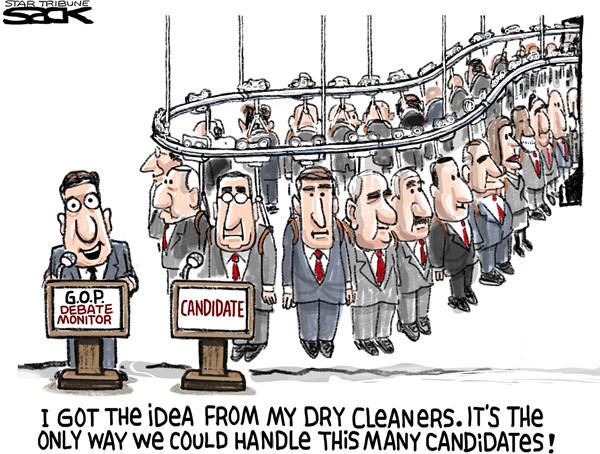
The first Republican presidential debate is approaching — Aug. 6 in Cleveland — and GOP candidates who are likely to miss the cut for the nighttime debate are stepping up criticism of the system.
First Curt Anderson, a veteran Republican strategist, former top official of the RNC, and now an adviser to Louisiana Gov. Bobby Jindal, published an op-ed in the Wall Street Journal entitled, "Let all 16 Candidates Debate." Anderson's argument is that the RNC plan to limit debates is backward-looking: it's a solution to a problem that plagued the poor-quality 2012 GOP field but is not present in the high-quality 2016 field. The RNC plan relies on irrelevant national polling, Anderson writes, giving unfair advantage to candidates with pre-existing name recognition — "retread candidates and political dynasties," as well as "personalities and circus acts."
"The Republican Party should be looking forward instead of backward," Anderson writes, "and seeking every opportunity to feature its roster of excellent candidates, rather than trying to find ways to constrict the field."
After Anderson's article appeared, fellow Republican strategist Alex Castellanos — a veteran of the 2008 Romney campaign who this year is not affiliated with any presidential candidate — sent out an email supporting Anderson's argument and adding a few points of his own. From Castellanos's email:
1. Every single GOP candidate who doesn't qualify to stand on the debate stage is within 2 percentage points of the last candidate to make the cut. Yet we are excluding these candidates via 1,000-sample surveys with a 3.5 percent margin of error at the 95 percent confidence level?
2. Seriously, the GOP has found a way to exclude the sitting, re-elected governor of Ohio, the sitting, re-elected governor of Louisiana, and the most serious female candidate for president the GOP has yet had (a former CEO who is smarter and tougher than most of the GOP guys running), from debates? Our adversaries would have to work hard to do us this much damage.
3. GOP contributors invest a lot of money to get candidates on television. Let me say that again: We actually pay real dollars to get them exposure on television. This year, when we have a great field of serious candidates, we have chosen to give them less free exposure? We are not exactly qualifying for MENSA with this one.
4. It is just plain wrong for the Washington elite and the news media to tell voters, at the outset of a campaign, which candidates they will fall in love in with and which they won't. That's a job for voters themselves.
In conclusion, Castellanos suggests one of not-included GOP candidates should demand that Fox News, which is producing the first debate, let all the candidates take part in the primetime session. Doing so would be a "an alpha-dog move" that would help the candidate "rise above the self-interested politics of the moment and establish him as the leader of the Republican Party," Castellanos writes. "Plus, it has the benefit of being the right thing to do."
Perhaps a candidate will follow Castellanos' advice. Perhaps one will challenge the debate structure in some other way. But as the debate approaches — it's now less than two weeks away — it seems likely that the GOP hopefuls who won't be on the evening stage are going to try to find ways to make the system work for them.
* Note: The author is a Fox News contributor but has not been involved in debate planning.
Comment by clicking here.



 Contact The Editor
Contact The Editor
 Articles By This Author
Articles By This Author